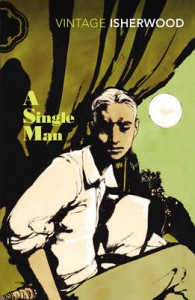Burgess and American Literature: Part Two
-
Graham Foster
- 18th April 2013
-
category
- Blog Posts
Exiled to Morocco for his apparent involvement in the shooting of a famous pop star, F.X. Enderby, Anthony Burgess’s hapless poet, meets a mysterious writer who ‘looked like an undertaker, mortician rather; his suit was black and his spectacles had near-square black rims, like the frames of obituary notices in old volumes of Punch’. This rather grim character is later seen cutting up pages of writing in order to make new poetry. He is, of course, based on William S. Burroughs, counter-cultural author of Naked Lunch and resident of Tangier at various points in the 1950s and 1960s.

This episode in Enderby’s global journey is inspired by two visits Burgess and his wife, Lynne, took to Tangier in 1963 and 1965. There, due to ‘hepatic exhaustion’, Lynne took to her bed, with Burroughs, a new acquaintance of the Burgesses, reading her Jane Austen ‘funereally’ as she dozed. After this first meeting, Burgess and Burroughs formed a kind of friendship, each being impressed by the other’s work. Burgess defended a number of Burroughs’s works, beginning with Dead Fingers Talk in 1963. He defended Naked Lunch against accusations of obscenity when it reached British shores.
In 1964, Burgess reviewed Burroughs’s novel in The Guardian. He writes: ‘As in any important piece of literature (and Naked Lunch is very important) one ends by admiring the art which is able to transmute such terrible subject matter into the pretext for a kind of joy’. Burgess also launched a similar defence of Last Exit to Brooklyn (1968) by Hubert Selby Junior, stating in his famous introduction: ‘The book is what the enlightened American judgement on Ulysses called “emetic”. To be sick may not be pleasant, but there is no law against making people sick. And there is not much common sense at work when a dose of mustard-and-water can be confused with a pinch of cantharides’.

Yet, Burgess was not so easily seduced by other works of American avant garde fiction. Writing about John Barth’s experimental novel Giles Goat-Boy in 1968, Burgess takes a more cautious approach: ‘Giles Goat-Boy impresses more with its concept than (sheer mastery of length apart) its execution. And the concept is available to any clever undergraduate. On the other hand, self-criticism is written into the book, and any disparagement of mine has already been well taken care of’.
American novelists, for Burgess, differed from British novelists because they ‘possess the courage to deal with big themes thrown up by contemporary history, whereas we in England tend to be too satisfied with provincial subject matter: class, hypergamy [or marrying above one’s class], suburban adultery’. Burgess sees this American courage as infectious, and sees it developing in many British ex-pat writers. For example, Christopher Isherwood’s novel A Single Man, is seen by Burgess as an American novel because it has a ‘dryness’ and an ‘eschewal of orotundity’ that ‘comments on American civilization as an American would’. Of course, Isherwood became a naturalised American citizen in 1945, and by the time A Single Man was published, he had been thinking of himself (and was described by others) as an American writer for nearly twenty years.
The ‘big themes’ of American novelists can be seen to influence Burgess’s own writing. Take, for instance, Another Country by James Baldwin. Burgess sees this novel to be about how ‘the divisions which society imposes on itself and regards as fundamental categories, are of no importance in the face of the only things that really count — the establishment of satisfactory human relationships, the pursuit of love’. While this is an unorthodox interpretation of Baldwin’s novel, as Burgess seems to imply that race and sexuality are of no consequence, he is still defending a controversial work of American literature. Another Country was published in 1962, five years before the legalisation of homosexuality in England. Burgess’s support of the novel helps depict him as defender of controversial works of literature, and shows that he was impressed with the American ‘courage’ to write about these themes. Further still, Burgess’s novel Earthly Powers has similar concerns. Kenneth Toomey’s metaphysical conundrum about the nature of homosexual love against the teachings of religion arguably parallels Baldwin’s idea that religious sin needs to be abandoned in order to accept homosexual identity.

It is clear that, in American fiction, Burgess sees a desire to challenge conventional norms. Despite its roots in Whitman-esque optimism, Burgess sees American literature as established on conflict. He writes, ‘America is two things – a potential and an actuality – and the actuality can never live up to the potential. The vast resources of the country, its scenic beauty, the racial wealth of its population promise so much and, indeed, fulfil something of the promise, but never enough. A small country like England can be forgiven for smallness of soul, but not a big country like America. That is why the persistent American theme is one of protest’.
What this says about Burgess’s own fiction is hard to gauge. He certainly was influenced by the ideas of literary avant garde in novels such as Naked Lunch, and the ideas of outsider protest that can be seen in Isherwood and Baldwin’s work, but perhaps he was seduced by America in that it offered a literary freedom to explore themes outside of the provincial work of British novelists. But also, many of the writers he was impressed by were internationalists, expatriates who had experience of other cultures and to some extent broken free of the established literary influences of their home nations. Burroughs, Isherwood and Baldwin (who lived in Europe for a number of years) all reflect Burgess’s own cosmopolitanism. After having a first taste of international life after moving to Malaya in 1954, Burgess would become a permanent expatriate in 1968 when he moved to Malta (and later Italy). His ever-evolving fiction shows he had transcended his roots in England and that he strove to write about ‘big themes thrown up by contemporary history’.


